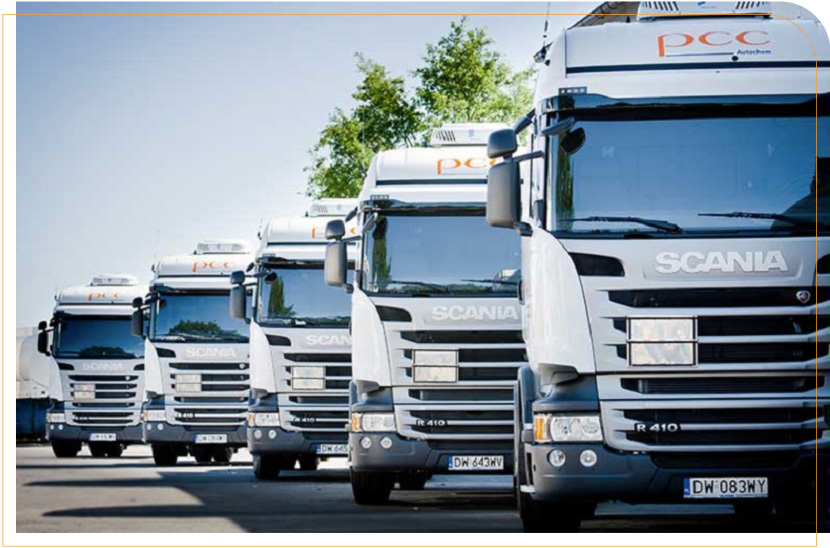
Transportation of Dangerous Goods, both in domestic and international carriage, is subject to strict legal regulations. Due to their properties, many of the raw materials used and surfactants and industrial formulations produced at PCC Exol SA pose a threat to health, safety, property, and the environment. They are therefore classified as dangerous goods.Every day, products manufactured at PCC Exol SA are delivered to customers by various means of transport, the majority of which are road tankers. A significant proportion of all the products offered by the company are therefore subject to the international ADR* convention on the carriage of dangerous goods by road. Therefore, as a member of the PCC Group, the Company actively supports activities under the Dangerous Material Carriage Assistance System (SPOT – System Pomocy w Transporcie Materiałów Niebezpiecznych). SPOT is an initiative of the Polish Chamber of Chemical Industry, established with the participation of associated manufacturers operating in the chemical industry, including PCC Rokita SA. The Company manages the Safety and Prevention Office and the Environmental Protection Office, which provide services to organizations operating within the structures of the PCC Group in Brzeg Dolny, including PCC Exol SA. The purpose of SPOT, as implemented in the PCC Group, are informative, preventive, and emergency activities that include technical assistance in road accidents and incidents that occur during the transportation of materials.

In the event of a failure of transport tanks or a road accident involving the means of transport that carry dangerous goods, the rescue services operating as part of the SPOT System provide quick and professional assistance in three basic stages:
The SPOT system is directly connected with the assumptions of the Responsible Care program. It is a testament to how seriously companies in the chemical industry treat their responsibilities in relation to safety, health, and the environment both in terms of their own activities and their impact on the environment.
In order to increase safety during the transportation of dangerous substances, at PCC Exol SA we choose, among others, specialized means of transport such as tank trucks and secured container loads. In addition to road transport, which is our primary method of delivering products to customers, we also use rail and sea transport, especially for routes outside of Europe. In such cases, transport is in accordance with the rules and conditions set out in RID, i.e., the international regulation on the carriage of dangerous goods by rail. In the case of sea transport, regulations described in the IMDG* apply. The IMDG is a guide that describes the standards for the transportation of dangerous goods by sea.
The Safety and Prevention Office which operates within the PCC Group takes appropriate measures to minimize the possibility of hazards occurring during the transportation of chemical products. These measures include supervision and control of proper loading, handling, and unloading, constant monitoring of handling sites, patrols of the On-Site Rescue Team, strict control of marking and of drivers’ licenses. Before entering the premises of PCC Group, persons who manage the means of transport or deliver or collect hazardous substances are required to put on protective clothing and footwear and to have other appropriate personal protective equipment, depending on the risk posed by the transported goods. In loading or unloading zones, those who participate in these processes should use additional personal protective equipment in accordance with the present applicable marking. This applies, for instance, to the obligation to use head, eye, and hand protection. Loading and unloading zones located at the premises of the PCC Group comply with European and global safety and environmental standards.
*ADR – (Accord européen relatif au transport international des marchandises Dangereuses par Route) is the international convention on the carriage of dangerous goods by road.
** RID – (Règlement concernant le transport international ferroviaire des marchandises dangereuses) is the international regulation on the international carriage of dangerous goods by rail
***IMDG – (International Maritime Dangerous Goods Code) is a guide for the safe transportation of dangerous goods by sea